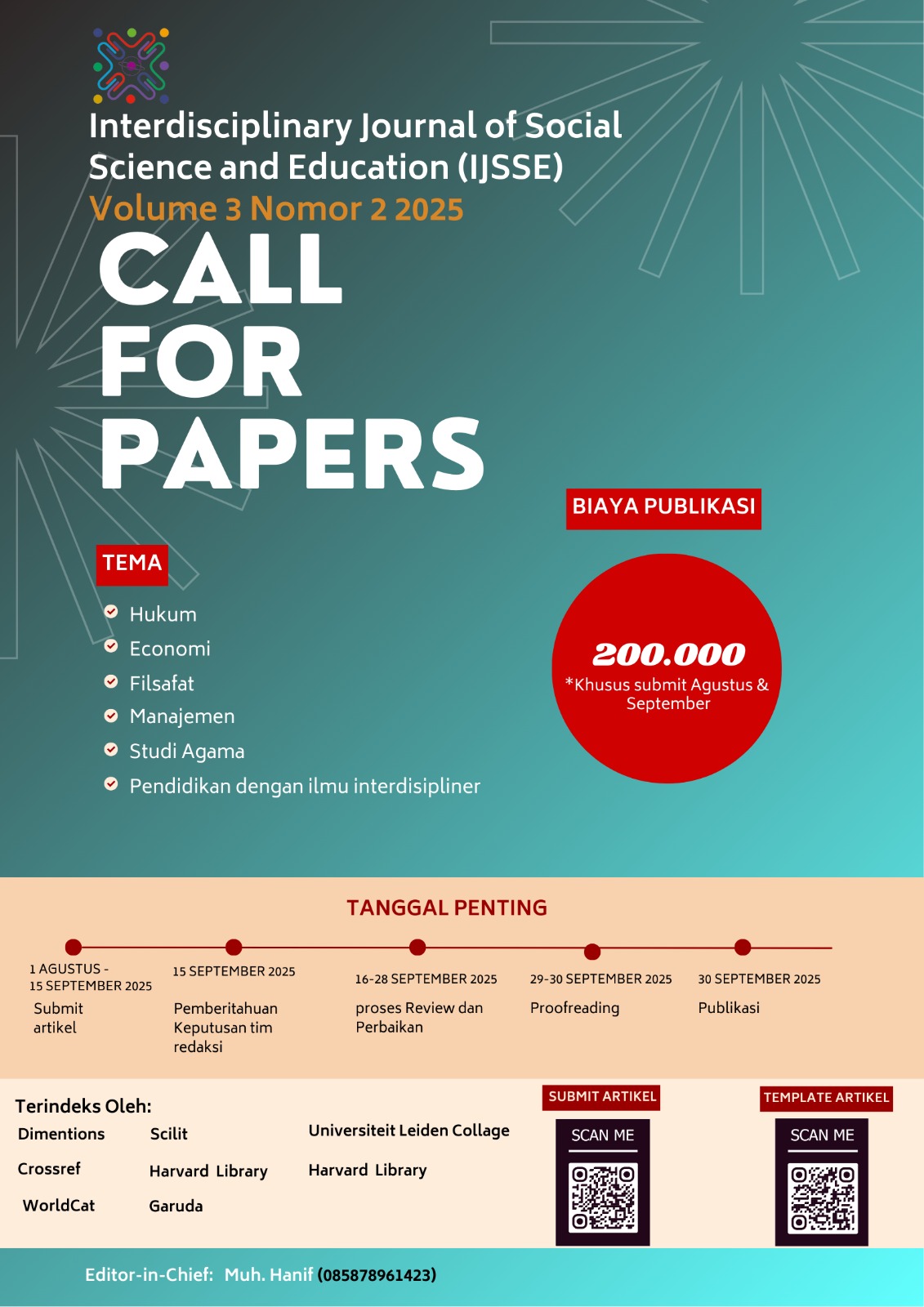Personal Approach in Islamic Religious Education Learning at Muhammadiyah 1 Middle School, Purwokerto
DOI:
https://doi.org/10.53639/ijsse.v3i1.60Keywords:
Personal Approach, Islamic education, Junior high schoolAbstract
Personal Approach as an alternative to improve the quality of Islamic Religious Education (PAI) learning. This approach works through the internalization of universal Islamic values, strengthening the spiritual dimension of students, examples of good behavior from teachers, and open two-way communication. This study aims to understand the planning, implementation, and evaluation of the application of the Personal Approach in Islamic Religious Education (PAI) learning at SMP Muhammadiyah 1 Purwokerto. This study uses a case study method with a qualitative approach to examine SMP Muhammadiyah 1 Purwokerto which is located in Banyumas Regency. Participants in this study were PAI Teachers, Principals, and Students at the school. The results of the study on the Personal Approach in Islamic Religious Education learning at SMP Muhammadiyah 1 Purwokerto identified three stages in its implementation: 1) Planning Stage, the school holds a preparatory workshop before the new school year begins 2) Implementation Stage, teachers approach students who are having difficulties one by one and then help solve the problems 3) Evaluation Stage, there are advantages and disadvantages in this approach and teachers handle it by holding remedial or providing learning outside the classroom to students.
Downloads
References
Akrim, A. (2022). A new direction of Islamic education in Indonesia: Opportunities and challenges in the Industrial Revolution Era 4.0. Edukasi Islami: Jurnal Pendidikan Islam , 11 (01), 35-48.
Aldrup, K., Carstensen, B., & Klusmann, U. (2022). Is empathy the key to effective teaching? A systematic review of its association with teacher-student interactions and student outcomes. Educational Psychology Review , 34 (3), 1177-1216.
Delima, DZ (2022). Implementation of Personal Approach in Overcoming Learning Difficulties of Grade XI Students at MAN 1 Central Lampung (Doctoral Dissertation, UIN Raden Intan Lampung).
Donkoh, S., & Mensah, J. (2023). Application of triangulation in qualitative research. Journal of Applied Biotechnology and Bioengineering, 10(1), 6-9.
Doyle, T. (2023). Helping students learn in a learner-centered environment: A guide to facilitating learning in higher education. Taylor & Francis.
Fitri, A., Nursikin, M., & Wismanto Amin, K. (2023). The dual role of Islamic religious education teachers in guiding problematic students at Al-Rasyid Islamic Elementary School, Pekanbaru. Journal on Education , 5 (3), 9710-9717.
Gamage, KA, Dehideniya, DMSCPK, & Ekanayake, SY (2021). The role of personal values in learning approaches and student achievements. Behavioral sciences, 11(7), 102.
Harita, A., Laia, B., & Zagoto, SFL (2022). The role of guidance and counseling teachers in the formation of disciplined character of students at SMP Negeri 3 Onolalu in the 2021/2022 academic year. Counseling For All: Jurnal Bimbingan Dan Konseling , 2 (1), 40-52.
Hidayat, MT (2024). Effectiveness of Personal Approach Method to Local Actors of Olibu Village in Improving Community Reading Interest. SERAMBI: Community Service Journal, 1 (1), 35-44.
Mahendita, S., Harmi, H., & Zakiyah, Z. (2024). Islamic Education Teachers' Strategies in Improving Students' Spiritual Attitudes at SMP Negeri 5 Lubuklinggau (Doctoral dissertation, Curup State Islamic Institute).
Maki, Z. (2024). Inclusive Education Design in Building Intrapersonal and Interpersonal Intelligence of People with Disabilities Based on the Qur'an (Doctoral dissertation, Institut PTIQ Jakarta).
Mujahid, I. (2021). Islamic orthodoxy-based character education: creating moderate Muslims in a modern Islamic boarding school in Indonesia. Indonesian Journal of Islam and Muslim Societies, 11(2), 185-212.
Nurmalasari, N. (2019). Approaches to classroom management. Al-Ilmi Islamic Education Journal , 2 (1).
Purwaningsih, E., Hadi, S., & Rahayu, D. (2022). An Analysis of Students' Ability in Writing Descriptive Text during Online Learning. The Journal of English Teaching for Young and Adult Learners, 1(1), 1-10.
Rakhmat, AT, & Hidayat, T. (2022). Pedagogical Foundations of Islamic Religious Education in Schools. Taklim: Journal of Islamic Religious Education, 20 (1), 13-28.
Ritonga, M., Sartika, R., & Wijaya, A. (2024). Differentiated Learning: Answering Personal Education Needs in the Society 5.0 Era. Pedagogik: Journal of Education, 19 (2), 163-170.
Sejati Permata. “Until September 2023, There Were 7 Motorcycle Gang Cases and 20 Sexual Cases Involving Children in Banyumas”. Accessed https://jateng.tribunnews.com on March 8, 2024 at 22.00 WIB.
Soendari Tjutju, Basic Principles of Individual Learning , Accessed at http://file.upi.edu on March 9, 2024 at 20.00.
Tiana, O.T. (2022). Using an Individual Approach in Learning Islamic Religious Education at Mts Pondok Pesantren Al-Muslimun Bandar Seikijang (Doctoral dissertation, Sultan Syarif Kasim Riau State Islamic University).
Tsoraya, N.D., Primalaini, O., & Asbari, M. (2022). The role of Islamic religious education on the development of youths' attitudes. Journal of Information Systems and Management (JISMA) , 1 (1), 12-18.
Zubairi, Z., Musthofa, M., & Khofifah, SN (2024). The Role of Islamic Education on Economic Growth. Islamic Banking & Economic Law Studies (I-BEST), 3 (2), 118-129.
Downloads
Published
How to Cite
Issue
Section
License
Copyright (c) 2025 Dhiya Roiha Anah, Novi Mayasari

This work is licensed under a Creative Commons Attribution-ShareAlike 4.0 International License.
Authors who publish with this journal agree to the following terms:
- Authors retain copyright and grant the journal right of first publication with the work simultaneously licensed under a Creative Commons Attribution License that allows others to share the work with an acknowledgement of the work's authorship and initial publication in this journal.
- Authors are able to enter into separate, additional contractual arrangements for the non-exclusive distribution of the journal's published version of the work (e.g., post it to an institutional repository or publish it in a book), with an acknowledgement of its initial publication in this journal.
- Authors are permitted and encouraged to post their work online (e.g., in institutional repositories or on their website) prior to and during the submission process, as it can lead to productive exchanges, as well as earlier and greater citation of published work (See The Effect of Open Access).


















